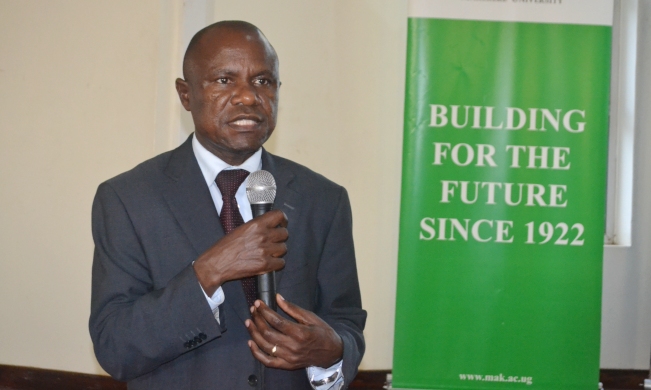The Acting Makerere University Secretary Dr. Eria Hisali has urged College Leaders to develop a self-evaluation mechanism that can help them align their achievements and accomplishments to the university goals and objectives. This was during the closure of the two days induction workshop organized by the Directorate of Human Resources, Makerere University.
Speaking to College Principals, Directors, Deans and Heads of Department on 31st October 2017, Dr. Eria Hisali said that evaluating one’s performance does not only improve on individual services delivery among University workers but also contributes towards the development of the University at large. He encouraged participants present to consider self-evaluation as one of the best methods of looking at performances and setting both job and career goals.

“Self-evaluation ensures that you prepare thoughtfully for your performance development planning, it helps to initiate an inner dialogue on your interests, performances and accomplishments. The method encourages personal growth, and facilitates career development. Remember a good return does not only sell an individual but also the University as a whole. Desirable and satisfying outputs scale the University to the greater heights both nationally and internationally,” he echoed.
He applauded the Staff Training and Development Division in the Human Resources Directorate for organizing the two days induction which he believed will improve on service delivery among University Officers.
The Acting Director of the Human Resources, Mrs. Dorothy Sennoga Zake thanked the members present for their positive participation in the induction. She encouraged participants to continue reminding themselves of the key issues that have been shared during the induction training as a way of tracking the contribution of the training in the execution of their duties.

“Learning is a continuous process, so let us continue sharing what we know and what we have learnt from the induction to help ourselves be efficient on our jobs,” she said.
The second day of the induction featured several presentations from University officials. In the presentation focusing on the role of College Leaders and College Registrars in the Collegiate System, the University Academic Registrar Mr. Alfred Namoah Masikye introduced the new decentralized system of issuing graduates’ transcripts to participants. According to Mr. Namoah Masikye, graduates will be in position to receive Academic transcripts from their respective Colleges.
“To ease service delivery, the University Central Management has decentralized the issuance of Makerere University academic transcripts. With this arrangement, the Academic Registrar will send printed Makerere University academic transcripts to the Office of the Principal in the respective Colleges and graduates will be in position to receive Academic transcripts from the respective Colleges. The Academic Registrar is putting in place several modalities to ensure the successful implementation of this decision,” he said.

The Senior Public Relations Officer Ms. Ritah Namisango called upon the college leaders to participate in, support and partner with the Public Relations and Communication offices to effectively communicate the milestones in teaching and learning, research and innovations as well as knowledge transfer partnerships and networking. Ms Namisango also highlighted the various sections of the Makerere University Communication Policy which stipulate the role of each office, University Management and members of staff in the execution of a two-way flow of information as well as effective communication processes.
Mr. Eric Tumwesigye appealed to the college leaders to emphasize the importance the Makerere University Policy and Regulations on Sexual Harassment Prevention to both staff and students. He urged them to revitalize the Anti-Sexual Harassment Committees, Gender Focal Persons at Colleges and put into consideration the needs of students with disabilities.
Other presenters included; The Acting University Librarian Dr. Hellen M. Byamugisha, Acting Director Internal Audit Mr. Benson Barigye, and the Labour Relations Officer Ms. Janet Nabukeera.

The second day of the induction was moderated by: Dr. Andrew Ellias State, Dr. Zahara Nampewo, Dr. Rose Nabirye Chalo, Dr. Sarah Ssali, Dr. Betty Ezati, Dr. Nakawunde Kulabako, Dr. Engineer Bainomugisha and Dr. Kamba Pakoyo. The training climaxed with award of certificates to participants.
Article by Kanyi Racheal, Volunteer, Mak-Public Relations Office


 General2 weeks ago
General2 weeks ago
 Natural Sciences2 weeks ago
Natural Sciences2 weeks ago
 Agriculture & Environment1 week ago
Agriculture & Environment1 week ago
 Health2 weeks ago
Health2 weeks ago
 General6 days ago
General6 days ago






